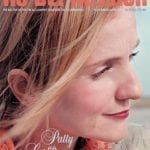BR549 – Back to Broadway
Robert’s Western Wear, which the band had single-handedly transformed into the best-known honky-tonk in town, still touted a sign out front that blared, “Home of BR549.” But Robert’s was booked full, and that was fine with its old champions. The band wasn’t looking to relive or revive that experience. They just wanted to have some fun, drink some beer, and take their minds off of career issues — much like everyone else on the street.
Still, maybe Mead, Wilson and Herron did go back seeking something — a sense of the off-the-cuff spontaneity that made their early years so exciting. Before opening for Bob Dylan and Alan Jackson and the Black Crowes, before the European jaunts and the Jack Daniel’s sponsorship, BR549 had experienced and inspired a magic that had dissipated with time, as it always does. They went looking for that spark.
The three musicians found a new temporary home at the Bluegrass Inn, where they joined a revolving-door assemblage of pickers billed as the Hillbilly All-Stars. Mead and Wilson became regulars. Herron joined in whenever he wasn’t playing in money-making country bands in Nevada and Bakersfield, California. Steel guitarists as well-regarded as Pete Finney and Pat Severs often sat in, too.
“It was just fun,” Mead says. “It was something to do to keep us busy. Here we were playing for tips again, and we didn’t care, we loved it. It just got us plugged back into that thing we love about playing country music for people who come in off the street and for our friends.”
Eventually, the Hillbilly All-Stars took on a semi-regular cast. Mead, Wilson, guitarist-singers Chris Scruggs and Joe Buck, and bassist Geoff Firebaugh formed a core band. Herron was a regular too, at least when he was in town. Scruggs, a fine lead guitarist and singer, played whatever string instrument was needed, whether it be bass, steel, electric or acoustic. It began to work in a way that moved beyond the loose-knit and into the realm of the real. It started to develop a sound of its own, an update on the BR549 sound with a greasier, harder edge.
“Those young guys lit a fire in us, to be honest,” Mead says. “They were having such a blast that it rubbed off on the rest of us.”
With time, Mead saw the possibilities. He’d already been a part of one successful band that formed in a similarly spontaneous fashion. He felt it happening again. Mead talked to Wilson and Herron first. How did it feel to them? They agreed; it felt like a band to them, too.
Next question: Do we call it BR549 or something else? “We agreed that we’d worked too hard and too long to establish the band’s name,” Mead says. “Why not be BR549?”
Mead suggested they start small, just take the band out on a short tour and invite Scruggs and Firebaugh along. Scruggs had his own band, the rockabilly-oriented Hoptown Tigers, and he had been playing with Rosie Flores for two years. The son of country singer Gail Davies (who raised Chris by herself) and bassist Gary Scruggs (a son of Earl Scruggs), Chris jumped at the chance to join BR549 because it gave him the opportunity to play lead guitar, sing and contribute a few of his own songs.
Firebaugh, a veteran of several Nashville punk bands, had been a fan of BR549 since the mid-’90s, and he was an old friend of Jay McDowell. Indeed, he had acquired his first acoustic bass from McDowell, and he had played with Scruggs in the Hoptown Tigers. Given the chance to join an establish touring band, he didn’t hesitate. “I thought it over for about as long as it took me to call my boss and quit my day job,” Firebaugh says. “I was in.”
The band’s booking agent, Darrin Murphy of CAA, knew he could get them work. BR549 always did particularly well through the Midwest and Southeast, and Murphy set up a short tour. First stop: Indianapolis. Maybe it wasn’t the best choice for the opening out-of-town gig — the first official show where this lineup billed themselves as BR549. Indy was Jay McDowell’s hometown.
Even though the former members supported the choice to continue the band, there were going to be fans who resisted. “Right before we went onstage, this group of people showed up at the back door, knocked and said, ‘Hey, is Jay here?'” Firebaugh recalls. “‘We’re here to see Jay. Where’s Jay?'”
Nearly two years later, the laughter is still nervous when recalling those first shows. “It was trial by fire,” says Shaw Wilson. “I mean, Geoff was standing right there when Jay’s friends showed up and asked for him. He’s carrying his bass, for God’s sake. So, sure, it was a hard night, but we got through it. We realized then that we were going to be judged, and that we were going to have to prove ourselves all over again night after night, and that there were people who weren’t going to accept the changes no matter how good we were. But in a way that just makes you better. You want to go out and prove yourself.”
The harshest reaction actually arrived in the letters section of No Depression #41 (September-October 2002). An Illinois resident who traveled to Chicago to see a show fired off a rant voicing his displeasure at going to see one band and finding that another lineup would be performing. The writer aimed his most vehement criticism at Scruggs, who was still in his first week of shows.




